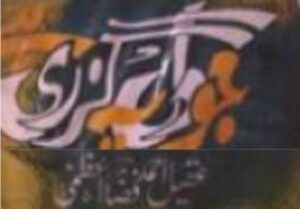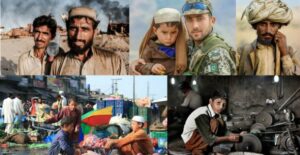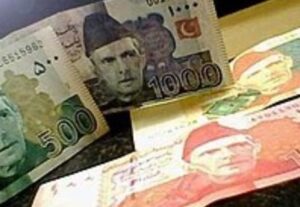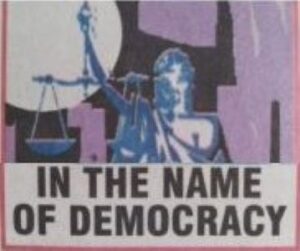Religion and Politics

By Shahid Rizvi
A Muslim country recently announced a law prohibiting religious parties from taking part in that country’s politics. The reason has been the extremism of fundamentalists who have been using violence and subversion for their purpose. Action against fundamentalism has been always and everywhere appreciated.
In other countries, such as Egypt and Turkey, the Islamic fundamentalists have also shown their presence in politics in a violent manner.
In other world religions, there are also fundamentalists such as Jews in Israel, who are also violent.
All the old witchcraft customs and traditions had human sacrifice as one of their essential worships. The religions such as Christianity, Hinduism and Buddhism etc., own their continuity to old witchcraft and other succeeding religions. The extremist and violent character of followers has come down primarily through inheritance from old religions.
The second most important reason has been the laws of religion itself. Every follower has to believe in certain tenets which are in all cases unalterable and not adjustable with the changing conditions. The belief that my religion is the only true and sacred religion and all other people on Earth should follow my religion results to the ultimate belief that every nonbeliever is supposed to be Kafir. It is the duty of every Muslim to try to preach Islam. The law is that in the Muslim State, a non-believer or believing in some other religion is a second-rate citizen who has to pay a special tax Jazia to the government for the protection of himself and his family. If he doesn’t pay that special tax, the government is not responsible for his protection.
Every religion has a number of different and often antagonistic sects. Christianity and Islam have 72 sects each, Hinduism, Buddhism and Jainism have even more!
The wards and bloodshed between different sects of Christianity and Islam are a part of history.
We her even today war slogans against different sects like Shia kafir, Qadiani kafir etc. in Pakistan. All these sects have been made to believe that God has made only that sect as true and loyal believer and that it is their duty to spread their belief, through force if necessary.
All of them believe also that the laws of good governance are only with them. These sects either are born of Caliphs or Imams, while some other have emerged from other origins. They have one common belief that only they are the chosen ones. This belief is coupled with the conception of Qiyamat when God will question them about their deeds in this world. They firmly believe that to please God any sacrifice is worthy for the purpose of propagating or protecting the religion. It is a God pleasing at to take part in sectarian conflicts and wars, according to them.
The orthodox religious beliefs have many other aspects too. Every follower is made to believe that the condition of human being is what God has made. Poverty or richness, health or sickness are only to due to His will. The peasant has become an addict to such an obedience. Pakistani peasantry is still living this coma.
The urban people are the generations born of the old villagers and inherited these beliefs. A Muslim is one who has born in a Muslim family. A Hindu is one who has born to Hindu parents. Since the religion is a package of beliefs which are not to the questions. Whatever explanation a religious scholar or Mullah gives, should be taken as true and correct. And who does not know that these Mullahs are a special creed, have vested interests and served vested interests. Mullahs vastly propagate that they have exclusive right to explain what has been said about religion.
Democracy s now the only and the best available ways of governance. Besides the fact that no other concept of government can be in conformity to it, any other concept always creates hinderance and blockades in the working of it. When someone starts with the religious thoughts of economy, social laws and politics proclaiming against democracy, it tries to retrograde and repress the democratic laws. Such a thinking is a big hindrance to democratic awareness.
The economic, political and social concepts of religion belong to periods when population was scarce, agriculture and the related trade of cattle raising, was nomadic, trade and business was through camel carvans and society had the barbarian laws. Today the situation, the atomic age, is altogether different. Geographical limits have become densely congested, society has civilized laws, economy is a huge and complicated machine, politics is sophisticated. Everything is varied and multi-dimensional. The slavery of man and women could not be eliminated then. No one can now imagine of slavery. The cooperation in finance without interest is a bogus idea now.
History reveals that religion and politics were never centralized except during the life of Holy Prophet (PBUH) and the Fourth Caliph. After the holy Prophet (PBUH), the head of the State was the first Caliph but the religious leadership was in the hand of Hazrat Aisah. During the life of the other two Caliph, the position remained the same. The Fourth Caliph has the authority on religion and State simultaneously.
After the death of the Fourth Caliph, the two functions of the State and the religion respectively were again separated. State head and religious authority were never the same from that time to this day. The whole history of Muslim rulers in Africa, Spain, Iraq, Iran, Turkey, India shows the court was never run by the Muslim religious Scholars or theocrats. The Imam of Hadith were given due reverence by the Court but were never allowed to advise on political affairs. Those who dared to do so were jailed or poisoned. The only exception is present day Iran which is a theocracy and forced to adopt some democratic norms which are not consistent with Islam.
Secularism is essential part of democracy. State has no religion. Everyone has his own personal beliefs and is not authorized to interfere with other’s belief. It is essential to clear the way of democracy and democratic justice.
The role of religious parties in Pakistani politics has born out of the two-nation theory. Support of moribund feudalism and exploiting religion for the purpose that has been main aim of those religious parties which came from India and also those which were created here afterwards. Hundreds of groups have cropped up as this is one of the best earning industries in Pakistan.
The role of religion was weakening the mass consciousness, making people believe the inevitability of exploiting social system, destabilize democracy, pressure groups against governments, blocking way to effective economic and social reforms, attracting people in the name of religion for anti-democratic means, fanning hatred feelings, arranging riots and violent law and order situation.
The first Martial Law was the result of Jamat-i-Islami’s anti-Qadiani riots. Every anti- democratic step of the government, very Martial Law was supported by the religious parties. This is our history of the past half a century.
Keeping in view the record of religious and sectarian parties, all parties created on the basis of religions should be banned from taking part in politics. Punishments should be awarded for propagating sectarian and racial hatred.








